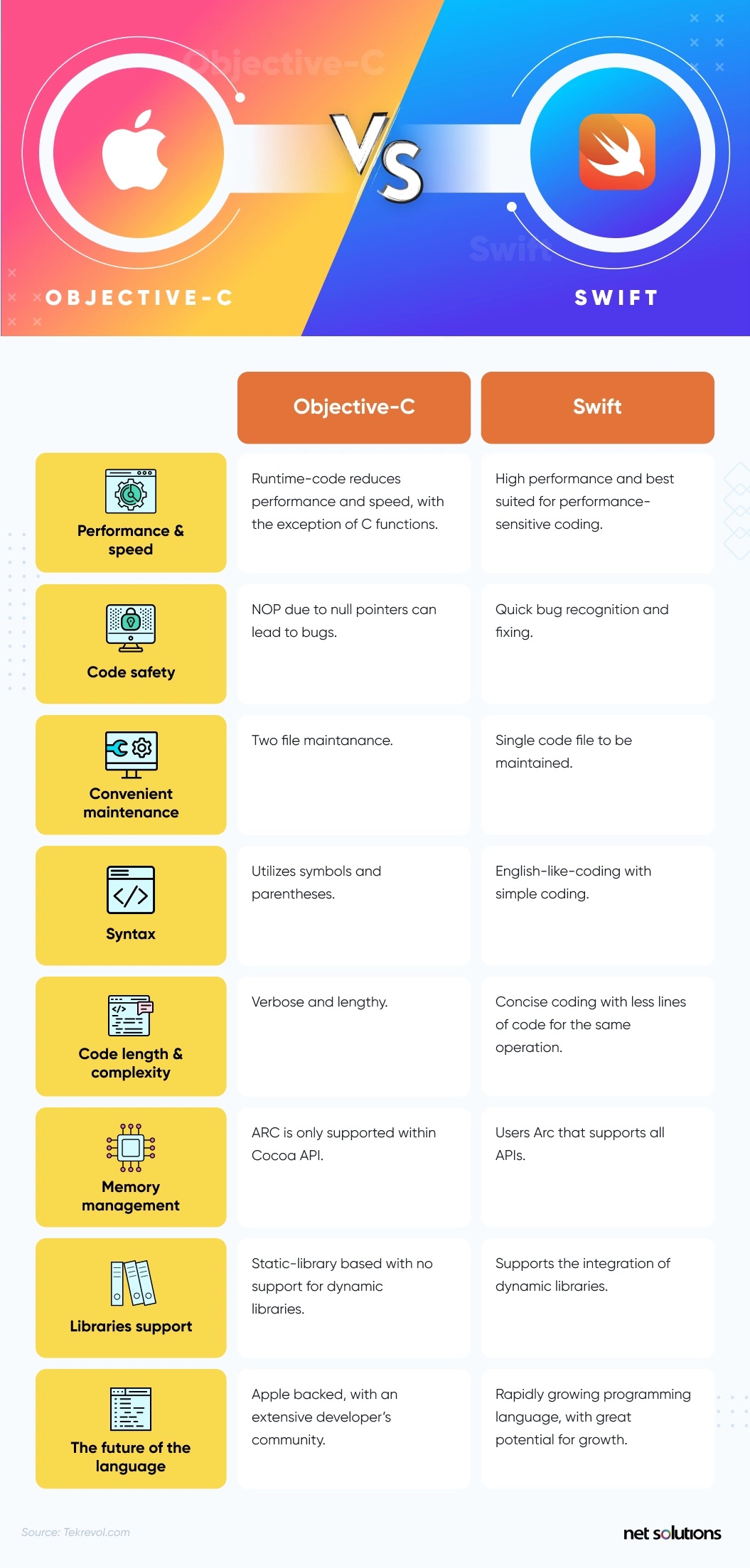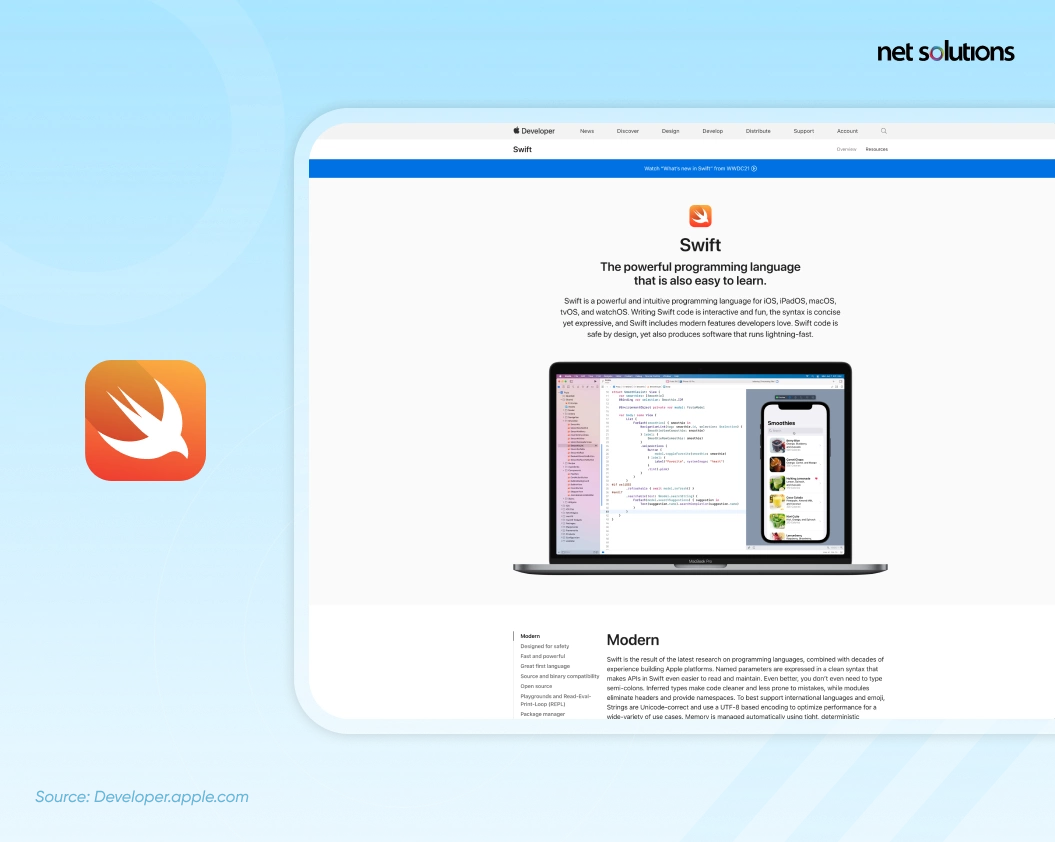Swift, Objective-C, and JavaScript + ReactNative are three popular iOS programming languages. Which one should you choose? It’s not that easy to decide. But this guide will help. Read on to reflect on the pros and cons of each of these languages and learn when you should use them and when you shouldn’t.
Apple released the first iPhone in 2007 and the original operating system for the iPhone, then called iPhone OS 1. In subsequent versions, iOS would grow to support a larger Apple ecosystem including iPhone, iPad, iPod Touch, and HomePod – in 2019, a variant of iOS was split off to introduce new features for the iPad, now called iPadOS.
Today there are more than 1 billion iPhones currently in use representing 23.4% of the global smartphone market, more market share than any other handset manufacturer. There are currently over 2.23 million iPhone apps in the Apple App Store, a number which continues to increase. It should come as no surprise, then, that quality iOS programmers remain in high demand – particularly those who know Swift, the latest iOS programming language.
"It’s a fairly new language, and developers who have adopted Swift are scarce.”
– Frederic Desmoulins for ZDNet
What is the best programming language for iOS and how do you choose the right iOS development language for your iOS App development? Read on to find out.
3 Best iOS Programming Languages for Developing an iPhone App
What languages are iOS apps written in? Which iOS programming language is best for your iPhone app? The two main programming languages for writing iOS apps include Swift and Objective-C.

1. Swift

Swift was introduced by Apple in 2014 as a replacement for Apple’s earlier official language, Objective-C, becoming an open-source programming language in 2015. As the official language, some would argue that Swift by default becomes the best programming language for iOS. Swift is a compatible iOS app development language for iOS7, OSX10.9 and higher.
Swift can be used to write applications for iPhones, desktops, servers or many other uses. It is known for being safe, fast, and expressive.
Advantages of Swift as an iOS Development Language:
- The official language of Apple
- Very easy for new programmers to learn
- Very simply syntax, helping speed up development
- Improved safety (fewer code crashes)
- Dynamic libraries reduce memory footprint
- Fastest iOS development programming language
- Full-stack capabilities
- Large community of support

2. Objective-C
Once the official language for iPhones, Objective-C remains a common iOS mobile app development language. Objective-C is an iOS mobile app development language first developed in the early 1980s as a variant of the C language, and thus is easy to learn for developers who already know C. However, for new developers, there is a steeper learning curve to Objective-C as an iOS development programming language.
Advantages of Objective-C as an iOS Development Language:
- Well-tested language
- Stable performance
- Compatible with C++
- Easy to connect with APIs
- Dynamic Tapping makes the coding environment more flexible
- Huge availability of resources for developers
3. JavaScript + React Native

JavaScript is one of the top programming languages all around, versatile for many kinds of projects and known to be fast and adept at creating rich user interfaces and experiences. When combined with React Native (a cross-platform framework), JavaScript can be used to build native iOS apps.
As an iOS app development language, JavaScript leveraging the React Native framework will not create an ideal iPhone app in terms of performance and may introduce some difficult engineering challenges, but it does allow developers familiar with JavaScript (and React Native) to produce an iPhone app without having to learn a whole new language.
Native iOS Development vs Cross-Platform App Development
In addition to the iOS coding languages specific to developing native iOS apps, there are several languages that can be used for custom mobile app development for what is known as cross-platform apps – apps that work on iOS and on other platforms such as Android. To understand, it is best to first define the difference of native vs. cross-platform app development.
- Native app development focuses on generating an app that is tailored to the specific features of the iOS platform or iPhone device, offering a more seamless user experience in terms of performance and visuals. The iOS app will only work on iPhone devices.
- Cross-platform development focuses on generating an app that reaches as many brand followers as possible by covering a wide range of end devices with a single app. Cross platform apps have a lower cost to development, but may not access all device APIs or meet the UI expectations of each device. Some lags in performance are expected.
Cross-platform app development includes the use of frameworks, the most popular of which are React Native Vs Xamarin, which in turn guide which languages are being used.

Know That There’s No “One Size Fits All” iOS Coding Language
An experienced iOS app development company knows that there is no “one size fits all” for coding iPhone apps. As outlined in our post on how to choose the right tech stack for your mobile app, beyond popularity or preference of one language over another, the choice in language can impact app performance, scalability, cost, as well as long-term support and maintenance.
Further, depending on what other app codebases are already being maintained within a company, it may make more sense to choose a language that does not require a whole new IT skill base.
Is it Best to Specialize in One iOS App Language or to Diversify?
As the demand for iPhone apps increases, so too does the demand for skilled iOS developers. In order to be a strong developer, it is good to know a little bit about both Swift and Objective-C, as some apps will be built using Objective-C – or even a combination of both languages.
As a new iOS developer, it would be ideal to focus on Swift first, as this is the most popular language still for new iPhone apps.
How Long Does It Take to Learn iPhone App Programming?
To learn one of the above languages for iPhone app development takes time and effort, on average anywhere from 3-4 months for general knowledge to over 1 year for a more firm mastery of the language – ideally with some experience alongside that knowledge. However, for more experienced programmers, this learning time is greatly accelerated. For example, those picking up Swift after already knowing Objective-C found the learning path much easier.
iOS coding languages such as Swift, Objective-C, and JavaScript can be learned in a school setting, via an online course, with the help of textbooks, or through many helpful development communities. As a new developer, the greatest benefit would likely be to jump straight into Swift, with some many helpful resources available on Apple’s developer website. In particular, Swift Playgrounds can help developers – even young or new ones – quickly learn how this powerful iOS app development language.
Frequently Asked Questions
1. What language are iOS apps written in?
Inside the .app file of an iOS app, you can see a CodeResources file that will list the frameworks being used. If that app lists a framework with “Swift,” it is either partially or entirely written in Swift.
2. What language is used to develop iOS apps?
iOS apps can be developed in one of the two main languages, Swift or Objective-C, or with JavaScript with the React Native framework. The other option for iOS development is to create a cross-platform app that works on both iOS and Android, an option which involves a wider range of language choices including Flutter, Xamarin and React Native.





